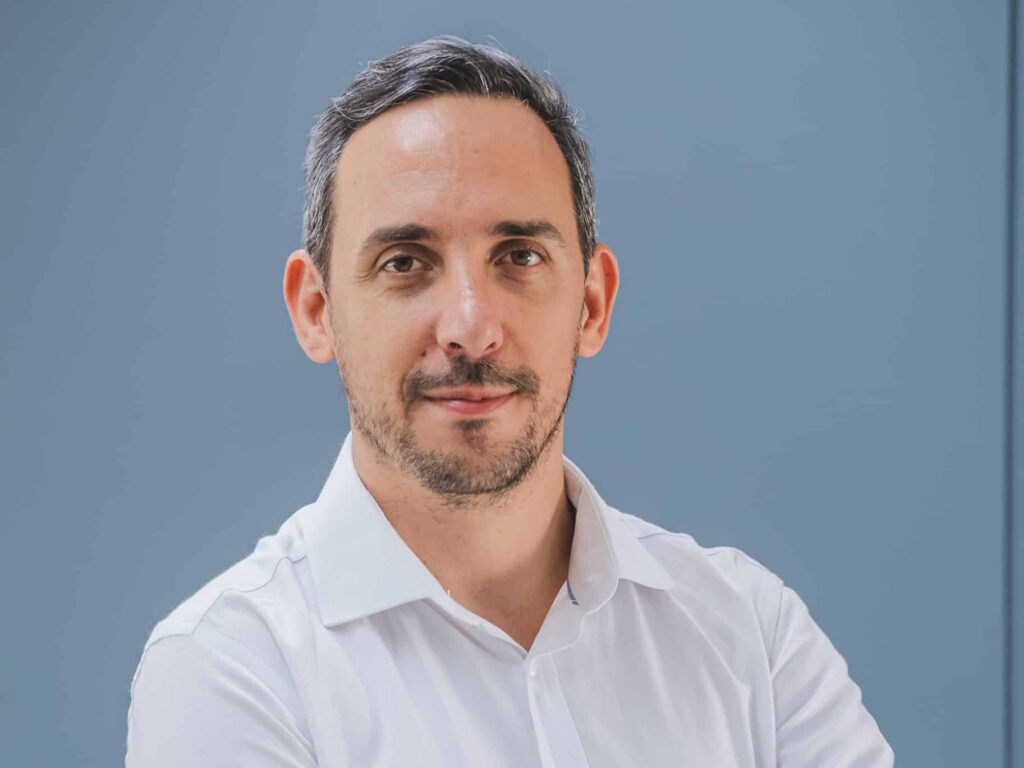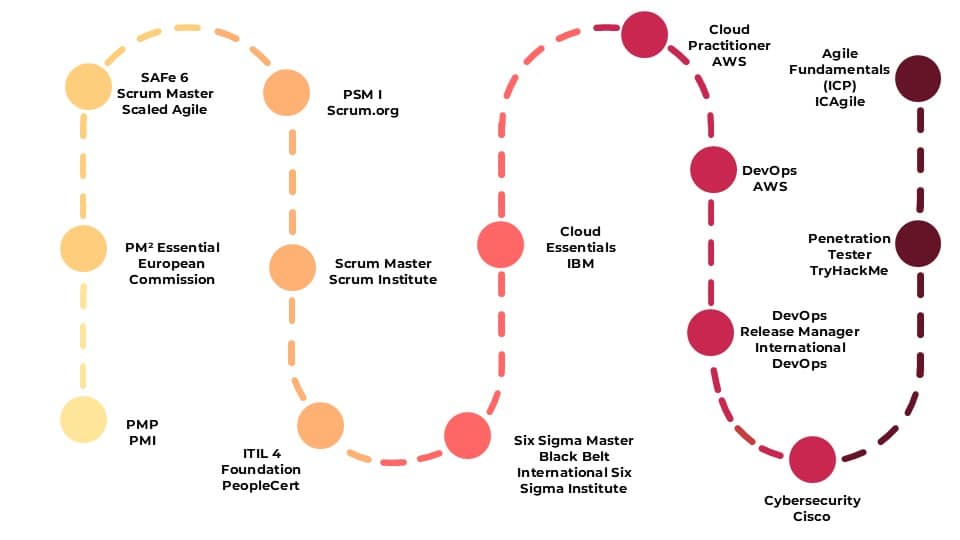
Insight from Odysseas Lekatsas MBA PMP, Consultant and Business Innovation Manager at MENARINI Group
When I embarked on the journey to obtain 20 project management (PM) certifications, I wasn’t able to fully understand the impact it would have on my career and personal growth.
Now, with that milestone achieved, I can reflect on the lessons I’ve learned—lessons that go far beyond the certifications themselves. This journey wasn’t just about checking boxes or adding more credentials to my resume. It was about continuous learning, growth, and transformation. In many ways, it changed how I approach both my work and life.
The Discipline of Continuous Learning
One of the most significant takeaways from completing so many certifications is the discipline it takes to stay committed. When you decide to dive into such a challenge, you don’t just need motivation—you need focus, patience, and a strategy. Balancing the demands of a full-time job, family, and these certifications taught me that time management isn’t just a skill; it’s a survival mechanism. Each qualification required a different approach, from understanding Agile frameworks like SAFe to mastering change management with ITIL.
This discipline was a double-edged sword. It helped me build a stronger sense of organization and productivity, which I’ve applied in every project since. Whether I’m leading a digital transformation in a multinational company or working with a small team on a CRM implementation, the ability to manage my time, prioritize tasks, and stay focused has been invaluable.
“Why So Many Certifications?”
A question I often get in interviews is, “Why so many certifications?” It’s a valid question, and at first, I was unsure of how to answer it. Some people assume that having so many qualifications signals insecurity, as if I’m overcompensating for a lack of experience. But the truth is, it’s quite the opposite. I’ve spent over 15 years managing projects across Europe, and my career path has naturally led me to take on different roles, each requiring a new set of skills. The certifications weren’t just about meeting the minimum job requirements—they were about ensuring that I could deliver value in every role I took on.
For instance, working as a Business Innovation Manager for a major European firm involved leading an ERP project that spanned seven countries. Understanding both Agile and Waterfall methodologies was crucial to coordinating teams across multiple regions. Each certification has given me a new perspective on how to approach problems, collaborate with teams, and manage risk. Rather than deep expertise in every area, my goal has been to gain a working knowledge of different frameworks, so I can adapt quickly and communicate effectively with diverse teams.

Opening Doors to New Opportunities
Beyond the obvious technical knowledge, certifications have opened doors I hadn’t even considered before. For example, becoming certified in Scrum Master and Six Sigma not only made me a better project manager but also allowed me to become a trainer. Teaching others forced me to internalize these concepts in a way I hadn’t before. It’s one thing to apply these principles in your own work, but explaining them to others requires a deeper understanding. It also added a new dimension to my career—I now consult and provide training to other professionals in project management and digital marketing, roles that I didn’t envision when I first started.
These certifications also allowed me to step into industries and projects that were previously outside my comfort zone. For instance, gaining AWS and DevOps certifications gave me the confidence to lead cloud migration projects, while my cybersecurity knowledge has enabled me to better manage the risks associated with digital transformation initiatives.
The Perception of Overqualification
There is a perception that having “too many” certifications can be a drawback, especially when applying for new roles. Employers sometimes wonder whether someone with so many qualifications might be overqualified or more interested in theory than practice. I’ve encountered this skepticism myself, but I’ve found that the key is to frame the certifications as evidence of a commitment to continuous improvement.
In interviews, I explain that these qualifications represent my willingness to adapt and evolve with the industry. I’ve had to tailor my responses to address concerns about being overqualified, emphasizing that my breadth of knowledge allows me to see the bigger picture in project management. Rather than focusing solely on the technical aspects of a single certification, I highlight how my diverse background helps me lead cross-functional teams and manage complex projects that require an understanding of multiple disciplines.
The Value of Collaboration and Empathy
One of the most important lessons I’ve learned through this journey is that certifications alone don’t make you a better project manager—collaboration does. It’s the ability to work with others, understand their challenges, and find solutions together that makes a project successful. Gaining certifications across different areas like Scrum, Six Sigma, and ITIL helped me understand the processes and pressures my team members face, whether they’re developers, analysts, or business stakeholders. This empathy has been crucial in resolving conflicts, managing expectations, and ensuring that everyone is working toward a common goal.
For example, while managing a large-scale digital campaign for a multinational client, I had to coordinate between marketing, IT, and external vendors. Having a broad understanding of project management frameworks helped me align these disparate teams, ensuring the project was delivered on time and within budget.
Lessons for Others on a Similar Path
If you’re considering pursuing multiple certifications, my advice is to approach it with a clear goal in mind. Don’t pursue certifications just to add one more—do it because it will add value to your work and help you grow as a professional.. Start with certifications that are most relevant to your current role or the direction you want your career to take, and build from there.
It’s also important to remain humble and open to learning from others. Certifications can sometimes give a false sense of expertise, but the reality is that every project is unique. The frameworks and methodologies are tools—not solutions in themselves. True success comes from knowing when to apply these tools and when to adapt them to fit the specific needs of your project.
My Reflections
So what I have learned having completed 20 project management certifications, is that while it has been rewarding, it has been a demanding experience. It instilled in me discipline, opened doors to new opportunities, and gave me the confidence to handle increasingly complex and diverse roles.
However, the most significant takeaway has been a deeper appreciation for collaboration, empathy, and the real need for continuous learning.
Whether you’re beginning your project management career or seeking to enhance your expertise, I encourage you to view certifications not as mere milestones but as tools for personal and professional growth.
With the true value being in how you apply your knowledge to elevate your team and yourself. I wish you continued growth and success!
Odysseas is a PMP-certified trainer and consultant in Project Management with over 15 years of experience. A regular contributor to project management publications and an active voice on LinkedIn, Odysseas specializes in ICT, Artificial Intelligence, and Digital Marketing. He has collaborated with numerous organizations across Europe, particularly in the pharmaceutical, security, and technology sectors. He is also a volunteer with the PMI Chapter in Greece. Based in Athens, you can connect with Odysseas on LinkedIn “Here” to follow the next steps in his personal journey.
Swanwick House, 22 Towcester Road, Old Stratford, Milton Keynes, MK19 6AQ, UK
© 2025 Project Management Global. All rights reserved | Privacy Policy